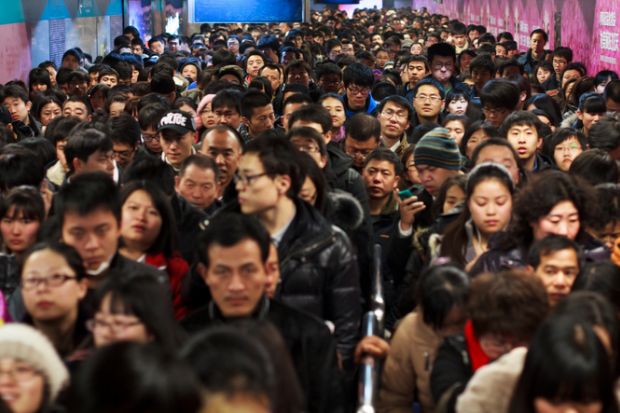China has stopped releasing statistics on youth unemployment, citing a need to improve how it is measured. But the move may leave universities in the dark amid intense pressure to improve graduate outcomes in a difficult jobs market.
The National Bureau of Statistics of China has said it is suspending the release of the unemployment rate for 16- to 24-year-olds until further notice because the methodology of its labour force survey “needs to be improved and optimised”, in light of the country’s growing number of students and questions over whether young jobseekers who have not graduated need to be included.
Fu Linghui, the spokesperson for the Statistics Bureau and head of its department of comprehensive statistics, said at a news briefing: “When the methodology has been improved, we will resume the updates promptly.”
Wu Keming, professor in the School of Educational Science at Hunan Normal University, told Times Higher Education that the suspension might increase the public’s anxiety about the ongoing jobs struggles of graduates and dent confidence in the figures.
“However, it is reasonable to improve the current methodology if it needs to be improved. It is advisable that the government further explain details of the flaws of the current method and the benefits of the future version,” he said.
In the last update, it was reported that China’s youth unemployment rate had reached a record high of 21.3 per cent in June this year, a sixth consecutive month-on-month increase. University graduates tend to be about 22 or 23 years old, and they make up about a third of the demographic captured in the youth unemployment statistics. Previous data indicate that the youth unemployment rate usually peaks in July, coinciding with the graduation season.
In such an uncertain environment, young people might double down on education, said one observer. “I can foresee that more young people with the means will pursue postgraduate education to delay entrance to the labour market and boost their competitiveness,” said Ewan Wright, assistant professor in the department of education policy and leadership at the Education University of Hong Kong.
For many, there is “a concern that an extended period of unemployment may harm their prospects”, especially if they are “forced to take a low position with few opportunities for career development”.
At the Statistics Bureau briefing, Mr Fu said that overall graduate employment rates were stable this year, although he did not reveal the relevant data. However, reports show that universities in China have been under increasing pressure to assist in driving down youth unemployment, and institutions have been making more effort to help graduates in the tough job market.
Professor Wu pointed out that methodological changes might not be helpful in judging whether things are improving because the new survey might not be comparable to previous ones, “so the data is not comparable to previous data for long-term studies”.
“Suspending updates on data releasing does not mean that issues of youth unemployment disappear”, Professor Wu said. “The fundamental cause of high unemployment is that economic development has slowed down. Therefore, when the economic development recovers, there will be more job opportunities.”
Register to continue
Why register?
- Registration is free and only takes a moment
- Once registered, you can read 3 articles a month
- Sign up for our newsletter
Subscribe
Or subscribe for unlimited access to:
- Unlimited access to news, views, insights & reviews
- Digital editions
- Digital access to THE’s university and college rankings analysis
Already registered or a current subscriber?










